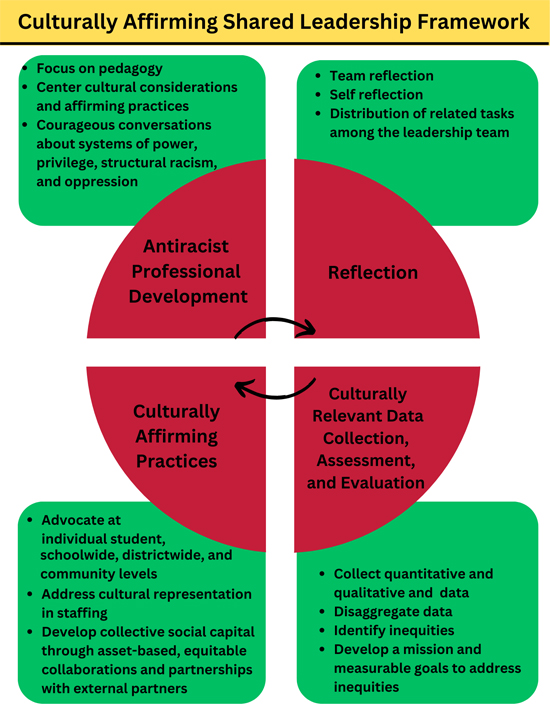
Transformational Leadership Together
By Eva M. Gibson, Ed.D., Mariama C. Sandifer, Ph.D., and Sarah N. Brant-Rajahn, Ph.D. | May 2024

When you decided to become a school counselor, did you realize you were signing up to be leader in your school? Within the context of school leadership, our ethical and professional standards outline our obligations to address systemic, equitable change in education and effectively work together with principals and other partners to have a positive impact on educational outcomes.
Assuming these responsibilities may not always be easy, with challenges stemming from structural, cultural and systemic factors. A common barrier is limited support from school administrators, who may not fully understand the scope of our role or the impact our services can have on school improvement and student success. However, our ethical standards state that we must engage in leadership to create change, supportive environments and equitable outcomes for students. The ethical standards also emphasize that we are leaders, advocates, collaborators and consultants, and our professional standards provide more detailed guidance on how we can demonstrate these expectations. The suggestions below can serve as resources as you lean into leadership.

Leaders with a shared mission and vision are more likely to achieve their goals. The CASL Framework is designed to leverage the unique expertise of each professional as they work together to dismantle systemic barriers and oppressive policies. Imagine how this could affect the students in your building.
Resources
Eva M. Gibson, Ed.D., is an associate professor at Austin Peay State University in Clarksville, Tenn. Mariama C. Sandifer, Ph.D., is an assistant professor at Austin Peay State University. Sarah N. Brant-Rajahn, Ph.D., is an assistant professor at Messiah University in Harrisburg, Pa.
Assuming these responsibilities may not always be easy, with challenges stemming from structural, cultural and systemic factors. A common barrier is limited support from school administrators, who may not fully understand the scope of our role or the impact our services can have on school improvement and student success. However, our ethical standards state that we must engage in leadership to create change, supportive environments and equitable outcomes for students. The ethical standards also emphasize that we are leaders, advocates, collaborators and consultants, and our professional standards provide more detailed guidance on how we can demonstrate these expectations. The suggestions below can serve as resources as you lean into leadership.
Identify Sources of Power to Bolster Student Support
Social capital is the effective functioning of networks of relationships within a group, and school-based social capital has been found to enhance student outcomes. School counselors can leverage this to support students, but you have to know who holds the formal and informal power in your spaces. These questions can serve as a starting point.- Other than your administrators, who wields power in your building? Don’t discount anyone based on their title. Think outside the box and consider positions such as administrative assistants and custodians.
- How can you find out who holds power? In a new environment, you will want to engage cordially, but be sure to watch and listen – that is the best way to learn about your environment and its dynamics. Be attuned to who colleagues readily follow and align themselves with, and who seems open to collaboration to utilize shared power.
- Who holds power in your district? Although most of your energy will be focused on your school, look beyond the walls of your building. Community leaders can be a good place to start.
Identify Necessary Skills of Effective Leaders
As professionals, we need to learn and exhibit best practices, but how do we know what those best practices are? Models can guide us. Within your district, some school counselors will stand out as leaders – connect with them and learn from them. If you receive this newsletter, you are likely already a member of your state school counselor association (SCA). Network within this organization and engage with leaders throughout your state. A great way to make connections is to get involved in your SCA and join a committee. These meaningful interactions will allow you to expand your professional network and further develop professional skills.Apply a Model of Leadership
Did you know there are leadership models specifically for school counselors? Here, we highlight a framework that focuses on shared leadership and culturally affirming practices: the Culturally Affirming Shared Leadership (CASL) framework, developed by Gibson, Thompson, Sandifer and Brant-Rajahn in 2022. CASL centers shared leadership between school counselors and school administrators. Collectively, these leaders engage in:- reflection
- culturally relevant data collection, assessment and evaluation
- culturally affirming practices
- antiracist professional development

Leaders with a shared mission and vision are more likely to achieve their goals. The CASL Framework is designed to leverage the unique expertise of each professional as they work together to dismantle systemic barriers and oppressive policies. Imagine how this could affect the students in your building.
Extend Your Leadership
How can you serve as a leader outside of your school building? This implies that you need to reach out and develop partnerships throughout your community. Partners can be local businesses, churches, fraternities/sororities, military units and more. Resources they provide can be tangible items such as school supply donations, or they can be development opportunities such as guest speakers, volunteers, career fairs, field trips, etc. Ask for support to contribute to the success and development of your students – they are worth it.Leadership Plan
Every journey starts with a first step. After reading this article, what step will you take to move along your leadership journey? Assess your status, identify your target, and get started this week. We may all be at different points in the process, but we share the goal of progress.Resources
- Intentional Equity Partners
- School Counselors and School Administrators as Intentional Equity Partners
- School counselors as leaders for social justice and equity
Eva M. Gibson, Ed.D., is an associate professor at Austin Peay State University in Clarksville, Tenn. Mariama C. Sandifer, Ph.D., is an assistant professor at Austin Peay State University. Sarah N. Brant-Rajahn, Ph.D., is an assistant professor at Messiah University in Harrisburg, Pa.